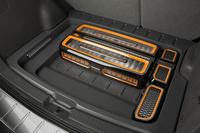2007 Detroit Auto Show; Johnson Controls-Saft Advanced Power Solutions Drives Ahead with Enhanced Batteries for Hybrid Vehicles
 Enhanced Batteries for Hybrid Vehicles |
Company gains contracts to develop and supply lithium-ion batteries for tomorrow's 'green' vehicles
DETROIT, Jan. 9 -- Major advances in lithium-ion battery technology will enable global automakers to introduce a new generation of highly fuel-efficient, "environmentally friendly" vehicles in the near future, according to officials at Johnson Controls. Engineers and scientists at the company's joint venture -- Johnson Controls-Saft Advanced Power Solutions (JCS) -- are gearing up to supply lithium-ion batteries for tomorrow's hybrid-electric vehicles (HEVs), plug-in hybrid-electric vehicles (PHEVs) and electric vehicles (EVs).
Last week, JCS was awarded an advanced battery development contract by General Motors to design and test lithium-ion batteries for use in the Saturn Vue Green Line plug-in hybrid SUV.
Since the launch of the JCS joint venture in January 2006, the company has made significant progress in the drive to position lithium-ion technology as the power-storage solution of choice for future, energy-efficient cars, trucks and vans.
"HEVs and PHEVs that leverage the benefits of lithium-ion battery technology represent the next step forward in developing sustainable transportation solutions for the global economy," said Alan Mumby, who leads the JCS joint venture and also serves as vice president and general manager of the Johnson Controls hybrid battery business. "We are thrilled to be a key player in enabling tomorrow's 'green' technologies."
According to Mumby, lithium-ion battery technology will become the technology of choice over nickel-metal-hydride, because it offers significant advantages in packaging, energy storage and energy-delivery performance.
Johnson Controls is showcasing a wide array of its power-storage solutions, including the latest advances in lithium-ion technology, at the 2007 North American International Auto Show (NAIAS) in Detroit. The company's exhibit, in room D2-15 at Cobo Center, features a display of a production-ready, lithium-ion vehicle battery system. It's integrated into a prototype, hybrid-electric SUV.
At the NAIAS event, officials from Johnson Controls also will provide details and insights about the company's recent successes in lithium-ion battery development, including:
-- The September 2006 signing of a letter-of-intent with a major
automaker, focusing on the supply of lithium-ion batteries, which
represents one of the industry's first lithium development orders.
Under the agreement, JCS will develop lithium-ion batteries for
evaluation, with production anticipated for the future.
-- The August 2006 contract award to JCS -- by the U.S. Advanced Battery
Consortium (USABC) -- supports continued development efforts on
lithium-ion technology for automotive applications. This funding is
provided by the U.S. Department of Energy through the USABC as part of
the FreedomCAR and Fuel Partnership project. The 24-month contract
enables JCS to continue its in-depth research on cell performance,
systems development, and cost containment surrounding lithium-ion
technology. USABC is a consortium of the United States Council for
Automotive Research (USCAR), an organization comprised of
DaimlerChrysler Corporation, Ford Motor Company and General Motors
Corporation.
-- Ongoing research and development work being done at the JCS
lithium-ion battery-development laboratory in Milwaukee. The facility
is the only one of its kind in the world devoted exclusively to
lithium-ion battery development for hybrid vehicles.
Johnson Controls is a global leader in automotive experience, building efficiency and power solutions. The company provides innovative automotive interiors that help make driving more comfortable, safe and enjoyable. For buildings, it offers products and services that optimize energy use and improve comfort and security. Johnson Controls also provides batteries for automobiles and hybrid electric vehicles, along with systems engineering and service expertise. Johnson Controls has 136,000 employees in more than 1,000 locations serving customers in 125 countries. Founded in 1885, the company is headquartered in Milwaukee, Wisconsin. For additional information, please visit http://www.johnsoncontrols.com/ .


